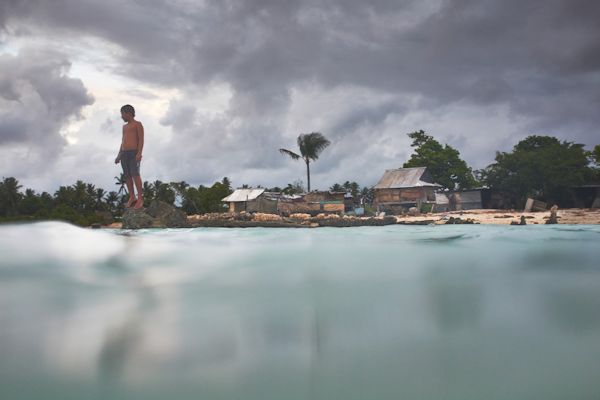SEJournal Online is the digital news magazine of the Society of Environmental Journalists. Learn more about SEJournal Online, including submission, subscription and advertising information.
 |
| The Sundance documentary selection “Anote’s Ark” features former President Anote Tong of the low-lying Pacific Island nation of Kiribati, who warns that sea level rise is creating a population of climate change refugees. Photo: Courtesy of Sundance Institute/Matthieu Rytz |
Feature: Searching for Environment Themes at Sundance 2018
By JoAnn M. Valenti
Environmental messages were more elusive than usual at this year’s Sundance Film Festival, where gender, race and immigrant issues dominated for 10 days in January at the Park City, Utah, event. But environment themes were there to be teased out.
For instance, a handful of representatives of indigenous communities were on hand at the annual gathering, in part to try to reframe climate change as a “human issue.”
Former President Anote Tong of Kiribati, one of the many low-lying Pacific Island nations threatened by sea level rise, was there for the screening of “Anote’s Ark” among world documentary features. The film tells the story of the first climate change refugees and warns of the unstoppable rise of sea level.
In the documentary, Anote acknowledges “it’s a bit late to reduce fossil fuels,” as he prepares islanders to relocate to New Zealand.
 |
| The documentary “Science Fair” explores how high school students from around the world confront environmental threats in their homelands. Photo: Courtesy of Sundance Institute/Pete Alton |
“We need a miracle,” Anote added. And yet, in an interview he assures me he has hope. “It’s a matter of when and how [it] will happen. … A global consensus is needed, with concrete solutions, especially for front line issues” such as his country faces.
While Anote has not met with Trump, he says he’s willing to. “[Trump] must have compassion as a human being,” Anote says, adding “He has not yet connected with the issue.”
Other films considered the issue of disappearing natural landscape and overdevelopment, such as “Leave No Trace,” in which military vets unprepared to return to normal life prefer living in wilderness encampments, only to be chased out by park rangers.
And two excellent documentaries, “Inventing Tomorrow” and “Science Fair,” showcase the largest convening of high school students from around the world for Intel’s International Science and Engineering Fair, where young innovators gather to confront environmental threats in their homelands with new ideas for testing water purity, combating air pollution and arming citizens with needed health information.
Also, a U.S. Dramatic Special Jury Award for Excellence in Filmmaking was presented to “I Think We're Alone Now,” an apocalypse story more about human need, or lack thereof, for companionship rather than what might lead to such a planetary catastrophe. Actors Peter Dinklage and Elle Fanning make the film worth viewing.
One U.S. doc, “The Devil We Know” — not to be confused with a soon-to-be released motion picture “The Devil Has a Name,” the true story of a psychotic oil matriarch, corporate greed and environmental apathy — has the potential to be another “Blackfish” or “Gasland,” reminding the world as it does of toxic releases in West Virginia by Dupont of the chemical carcinogen C8, which is used in making Teflon.
The festival ultimately awarded 123 feature-length and 69 short films, selected from 13,468 submissions from 29 countries.
JoAnn Valenti is an emerita professor and long-time SEJ member who lives in her home state of Florida.
* From the weekly news magazine SEJournal Online, Vol. 3, No. 11. Content from each new issue of SEJournal Online is available to the public via the SEJournal Online main page. Subscribe to the e-newsletter here. And see past issues of the SEJournal archived here.














 Advertisement
Advertisement 



